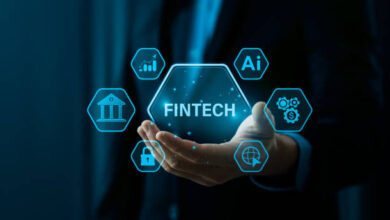Fintech Explained Simply: The Future of Money and Banking
How financial technology is reshaping banking, payments, and the future of money worldwide.

By the way people interact with money has interchanged significantly in the prior decade. Through clearing bills on our smartphones to sponsoring with the click of a button, technology is transfigured financial services at lightning speed. This finance and technology convergence is known as fintech, it is a short form of financial technology. It is influencing the future of money and banking over the globe.
What is Fintech?
Use of technology to enhance, robotise and renovate financial solutions at its centre fintech relates to it. While financial foundations and banks have used technology for years, fintech is going ahead by initiating pioneering solutions which generate money management speed, more secure and more attainable. For the time being, fintech empowers each and everything from mobile banking apps and digital payment platforms to advanced tools like blockchains and data centric financial technology. In simple terms, fintech is about formulating financial services smarter and more user friendly whether they are transferring money, leading a business or trading virtual currencies.
Everyday Examples of Fintech
Among the most materialized norms of fintech is mobile banking. Rather than visiting a branch, now people manage their finances personally from their handsets. They check balances, money transfer, check deposits and still can apply for a lease, staying at home. Mobile banking just not only became life easier, also helped enlarge financial services to people in pastoral or deprived regions. A further popular example is payment gateways like PayPal, Band or Square. These tools authorize customers and professionals to send and draw money securely online. For webshops, payment gateways are vital, they enable it possible for consumers to shop with swipe cards, digital wallets or even cryptocurrencies, promoting smooth and safe transactions.
Fintech Beyond Consumers
Fintech is not only for individuals, it plays a significant role in business technologies as well. Fintech in small professional finance has opened opportunities for business persons who would otherwise battle with traditional banking. Although lengthy validation processes, own business operators can immediately access online granting platforms that use data driven algorithms to sanction loans quickly. Accounting software run by fintech also self operates payroll, invoices and taxes, saving professionals valuable time. This modification of finance has made it easier for founding and small enterprises to spread and contend with larger corporations.
The Role of Blockchain in Fintech
One of the most comprehensive technologies empowering fintech is blockchain. Named as the backbone of virtual currencies like Bitcoin and Ethereum, blockchain is a distributed ledger that records transactions safely and clearly. In fintech, blockchain does further to support digital currencies. It enables speed and inexpensive transborder payments, lessens fraud by ensuring data cohesion and makes methodologies like smart contracts possible. Banks and businesses are increasingly prospecting blockchain to modernize systems that were once extortionate and expensive.
Opportunities and Risks
Challenges come with fintech which creates exciting opportunities. Digital fraud is one of the economical risks. financial activities are moving online to a large extent, cybercriminals are searching out new courses of action to exploit flaws in systems. Phishing frauds, identity spams and sammy transactions are growing concerns. To overcome these risks, fintech organizations are advancing to innovate solutions like biometric authorization, encryption and fraud detection empowered by artificial intelligence. These measures not just help protect consumer data but also strengthen faith in digital finance.
The Power of AI in Financial Services
Possibly the most encouraging advancement in fintech is the use of AI centered financial services. Artificial intelligence can analyze huge amounts of financial data fastly, providing insights that were impossible some times ago. AI empowered robotics that offer automated finance strategies customized to individual goals in personal finance. AI leads to fraud detection by identifying deviant spending behaviour instant in transaction. AI is also enhancing customer service. Virtual and digital assistants can handle routine banking inquiries continuously while algorithms of machine learning help banks to make smarter lending recommendations. These innovations are applying new standards speedily together, efficiently and personalization in finance.
The Future of Money and Banking
Further, fintech will constantly reanalyze the process of how people and businesses hold money. Traditional banking is progressing to adopt fintech innovations to remain in competition while startups are pushing limits with advanced solutions. We are going towards a bright future where financial services will be more programmed, comprehensive and intelligent. From financial technology that enlarges small business organizations to AI driven financial services that supply intelligent wealth management, the future of money and banking will be molded by innovation. Simultaneously, ensuring security and shield against digital fraud will remain peak priorities.
Conclusion
Fintech is now part of the norm of an industry, it is the strong influence behind the global financial system. By integrating finance with technology. It has exhibited more systematic, secure and user friendly services for both consumers and businesses. Whether through mobile banking, blockchain, payment gateways or tools for small business finance, fintech is revolutionizing the route we think about money. The future of banking will be less about attending to a branch and mainly about having economical power at your fingertips. As fintech continues to grow, it promises not just convenience but also mainly an inclusive and creative financial world.
FAQ’s
1. What is financial technology or fintech?
Financial technology or fintech is the way to use modern and digital tools and innovations to enhance financial support. It holds applications like online banking, money transfer apps, trading platforms and digital credit solutions.
2. How does mobile banking fall under fintech?
Mobile banking is one of the most often used fintech utilities. It allows consumers to manage accounts, deposit money, make payments and might apply for loans directly from smartphones, offering convenience and accessibility.
3. What role does blockchain play in fintech?
Blockchain is a secure and propagated technology that propped out cryptocurrencies and many fintech options. In fintech, it is used for clear transactions, fraud prevention, smart dealings and transborder payments.
4. Why are payment gateways important in fintech?
Payment gateways behave as negotiators between customers, merchants and banks that enables secure online transactions. They are crucial for ecommerce, mobile wallet and contribution based services.
5. What are the positive impacts of fintech to help small businesses?
Fintech in small corporations supplies applications such as e-lending, digital accounting platform and mobile payment apps. These innovations make it smoothen for small businesses to obtain credit, manage money circulation and compete with leading organizations.


